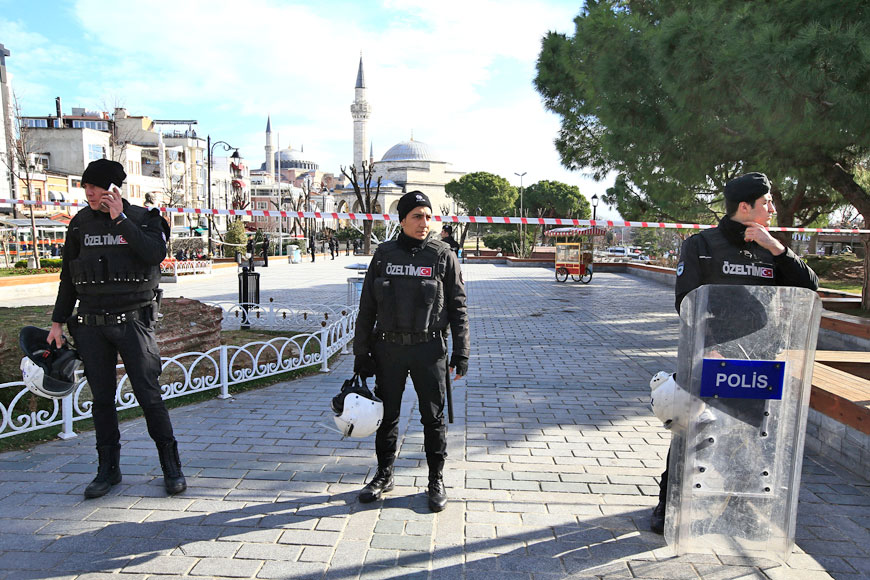ISTANBUL — A suicide bomber affiliated with the Daesh group detonated a bomb in a historic district of Istanbul popular with tourists Tuesday morning, killing at least 10 people — nine of them German tourists — and wounding 15 others, Turkish officials said.
Turkish Prime Minister Ahmet Davutoglu said the bomber who carried out the attack in Istanbul's Sultanahmet district was a member of Daesh and pledged to battle the militant group until it no longer "remains a threat" to Turkey or the world.
Davutoglu described the attacker as a "foreign national". Deputy Prime Minister Numan Kurtulmus had previously said the perpetrator was born in 1988 and was a Syrian national, but the private Dogan news agency claimed the bomber was Saudi-born.
“Turkey won’t backtrack in its struggle against Daesh by even one step,” Davutoglu said. “This terror organisation, the assailants and all of their connections will be found and they will receive the punishments they deserve.”
Turkey’s state-run news agency said Davutoglu held a telephone conversation with German chancellor Angela Merkel to express his condolences. A senior government official confirmed that most of the victims were German. Merkel had earlier said they were part of a German travel group.
“I strongly condemn the terror incident that occurred in Istanbul, at the Sultanahmet Square, and which has been assessed as being an attack by a Syria-rooted suicide bomber,” President Recep Tayyip Erdogan said.
Davutoglu said the death toll of 10 did not include the suicide bomber.
Merkel, speaking at a news conference in Berlin, decried the attack.
“Today Istanbul was hit; Paris has been hit, Tunisia has been hit, Ankara has been hit before,” she said. “International terrorism is once again showing its cruel and inhuman face today.”
The explosion, which could be heard from several neighbourhoods, was at a park that is home to a landmark obelisk, some 25m from the historic Blue Mosque.
Turkey’s Dogan news agency reported that one Norwegian and one Peruvian were also among the wounded, and Seoul’s foreign ministry told reporters via text message that a South Korean had a finger injury. The Norwegian foreign ministry told news agency NTB that the Norwegian tourist was slightly hurt and was being treated in a local hospital.
Kurtulmus, the deputy premier, said two of the wounded were in serious condition.
Germany and Denmark have warned their citizens to avoid crowds outside tourist attractions in Istanbul.
Last year, Turkey agreed to take a more active role in the US-led battle against the Daesh group. Turkey opened its bases to US aircraft to launch air raids on the extremist group in Syria and has carried out a limited number of strikes on the group itself.
It has also moved to tighten security along its 900km border with Syria in a bid to stem the flow of militants.
The attack comes at a time of heightened violence between Turkey’s security forces and militants linked to the outlawed Kurdistan Workers’ Party, or PKK, in the country’s mostly-Kurdish southeast.
The country is also dealing with more than 2 million Syrian refugees and a wave of migrants from Syria and other countries pouring across Turkey to Europe.
Police sealed the area, barring people from approaching in case of a second explosion, and a police helicopter hovered overhead.
The Sultanahmet neighbourhood is Istanbul’s main sightseeing area and includes the Topkapi Palace and the former Byzantine church of Haghia Sophia, now a museum.
Erdem Koroglu, who was working at a nearby office, told NTV television he saw several people on the ground following the blast.
“It was difficult to say who was alive or dead,” Koroglu said. “Buildings rattled from the force of the explosion.”
Halil Ibrahim Peltek, a shopkeeper near the area of the blast told The Associated Press it had “an earthquake effect”.
“There was panic because the explosion was violent,” he said.
Davutoglu immediately convened a security meeting with the country’s interior minister and other officials.
As with previous attacks, authorities imposed a news blackout, barring media from showing images of the dead or injured or reporting any details of the investigation.
Turkey suffered two major bombing attacks last year, both blamed on the Daesh group.
More than 30 people were killed in a suicide attack in the town of Suruc, near Turkey’s border with Syria, in July.
Two suicide bombs exploded in October outside Ankara’s main train station as people gathered for a peace rally, killing more than 100 in Turkey’s deadliest-ever attack. The prosecutor’s office said that attack was carried out by a local Daesh cell.
Last month, Turkish authorities arrested two suspected Daesh militants they said were planning suicide bombings during New Year’s celebrations in the capital Ankara.
